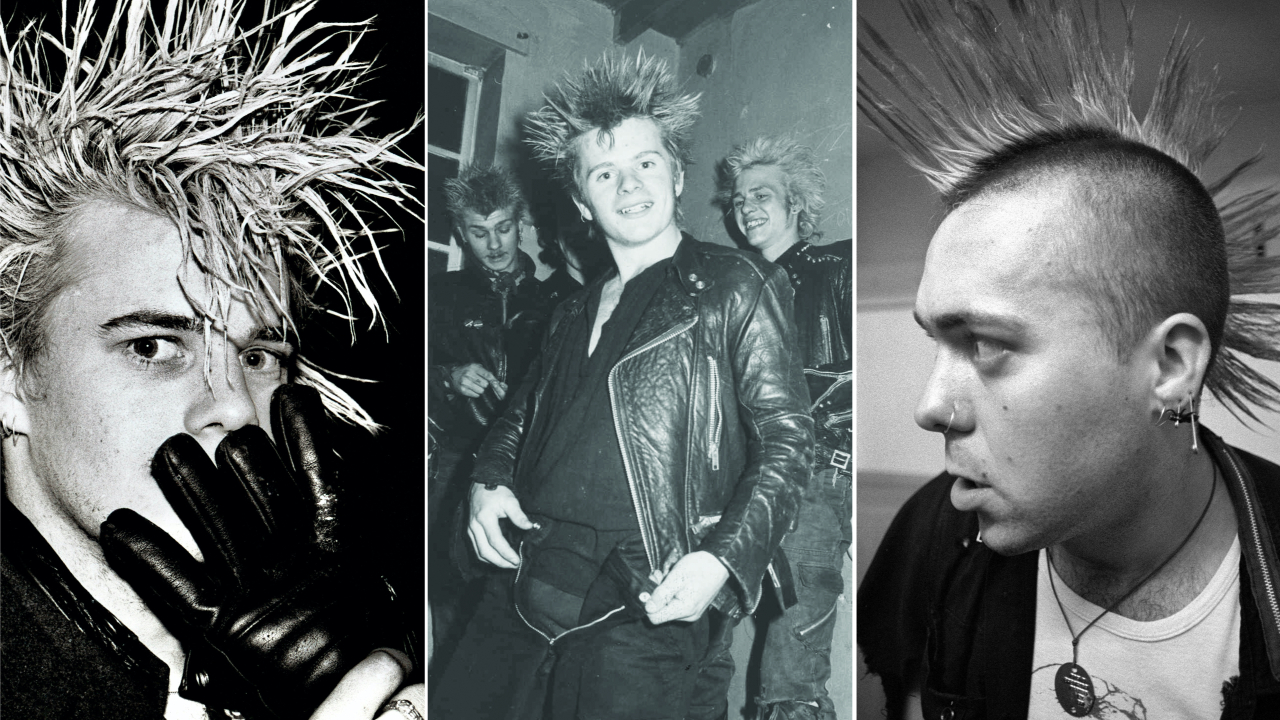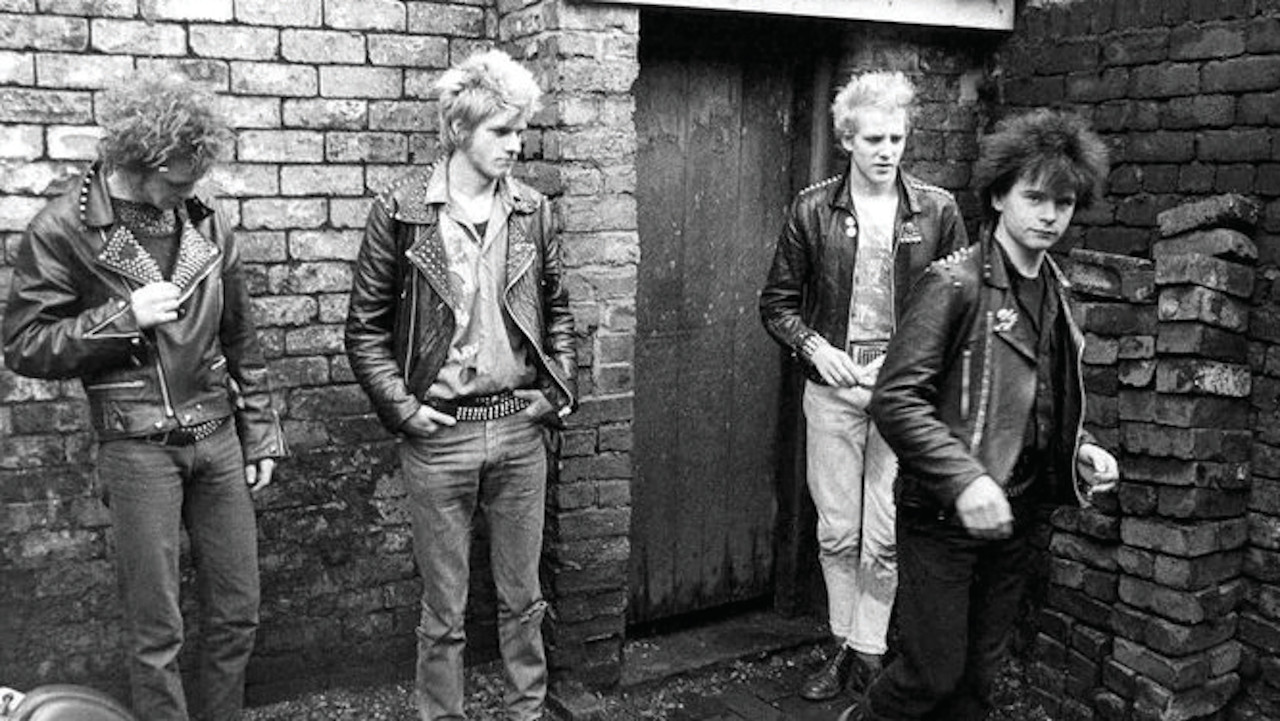
In 1983, Anthrax guitarist Scott Ian saw a band that changed his life. Growing up in New York, he’d been aware of punk since the arrival of the Ramones, but heard enough horror stories about what the punks would do to “longhairs” that he decided to avoid the city’s legendary CBGB’s venue. That all changed when The Exploited came to town.
Scott was a big fan of the Scottish band’s 1982 album Troops Of Tomorrow, and he headed to downtown Manhattan club The Great Gildersleeves with then-Anthrax singer Neil Turbin and bassist Dan Lilker to see the band play and watch anarchy unfold.
“The Exploited came on and the crowd erupted into what I soon found out was called slam-dancing; I’d never seen anything like it!” Scott says now. “All these punks and skinheads losing their minds and stagediving, it was very physical and I was blown away. I wanted to go down and get into it, but Neil grabs me and is like, ‘You don’t wanna do that - they don’t like longhairs!’”
Hopped up on aggro and sporting foot-high mohawks, The Exploited and kindred spirits Discharge and GBH led a wave of bands who took punk and made it heavier, faster and more brutal. This movement – retrospectively dubbed UK82, after an Exploited song of the same name – would be a huge influence on the nascent thrash and extreme metal movements that followed, inspiring everyone from Anthrax and Metallica to Napalm Death, Neurosis and countless bands around the world today.
“When I was 12 I was searching for something that would inspire me and help release the aggression I had inside,” says Anastasiya Khomenko, drummer with Ukrainian hardcore newcomers Death Pill. “I discovered The Exploited, GBH and Discharge around the same time – I heard [Discharge album] Never Again and since then I’ve always been very close to fast punk music. It was amazing: raw, aggressive, fast… what else do you need when you’re 14?”

At the end of the 70s, punk was in bad shape. The scene’s founding fathers had either split up (Sex Pistols) or were moving away from their original fast and furious sound (The Clash, The Damned). The New Wave Of British Heavy Metal had repurposed punk’s DIY spirit, and was producing its own heroes in the shape of Saxon, Def Leppard and Iron Maiden.
The news of punk’s impending demise clearly hadn’t reached Edinburgh when The Exploited formed in 1979. Fronted by Wattie Buchan, an ex-squaddie with an enormous red mohican and a Scottish accent that bordered on indecipherable, their defiantly titled debut album, 1981’s Punk’s Not Dead, plastered football-terrace chants over high-speed, ultra-aggro beats.
A couple of hundred miles south in Stoke-on-Trent, Discharge were similarly upping the ante. “In the early days Discharge were basically a Sex Pistols cover band,” explains guitarist Tony ‘Bones’ Roberts, who co-founded the band in 1977. But as the band’s line-up changed, so too did its sound. “It was like a new band once [singer] Cal joined. We started playing faster and our sound just became harder as a result.”
GBH formed the following year in Birmingham – specifically in The Crown, the same pub that hosted Black Sabbath’s early gigs. “Everyone that went to The Crown was trying to form a band, but we carried through with it,” GBH singer Colin Abrahall recalls. “We’d run everything through this one amp and [original GBH drummer] Wilf hadn’t got a full drum-kit, so he’d tap along on an electric fire! We played faster because it hid the mistakes.”
The sound the three bands eventually developed had as much in common with Motörhead’s grimy, forceful noise as it did the Sex Pistols or The Clash’s snotty broadsides, yet the wider punk and metal scenes were like oil and water, each eyeing the other with disdain and sometimes violence, though a few brave souls did occasionally cross the line.
“There were always a few metal fans at our gigs, even in the early days,” says Bones with a laugh. “The brave ones.”
Where punk’s original poster boys swung between nihilism and rebellious posturing, The Exploited, Discharge and GBH were fuelled by frustration and anger at the state of the world around them.
“Birmingham was an industrial city that’d just got out of the three-day weeks… power cuts, lots of unemployment. It was a rough, tough place,” Colin recalls. “Getting off the bus, you could be attacked by a gang of skinheads, bikers or straights. It was hairy.”
Unsurprisingly, disdainful major labels kept these spiky haired hooligans at arms’ length. Instead, it was down to independent UK labels like the London-based Secret (which released The Exploited’s debut) and Stoke-On-Trent’s Clay to unleash this snarling noise on the world. Both GBH and Discharge were signed to Clay, the latter after label founder Mike Stone saw an audience member throw a slab of beef at the band during a show in Stoke.
Released in April 1981, Discharge’s EP Why? was a cacophony of feedback, proto-blastbeats and infuriated howls, cramming 10 tracks into a little under 15 minutes and reaching No.1 in the UK Independent Charts. That same month, The Exploited’s debut Punk’s Not Dead reached No.20 in the official charts, earning the band an invitation onto Top Of The Pops for a memorable performance of the song Dead Cities. Wattie later joked that The Exploited “were probably the only band to sell less records after [our] appearance”.
Suddenly, provincial towns and cities up and down the country had their own clique of kids with Exploited-style mohicans and Discharge logos painted on the back of their jackets: Vice Squad and Chaos UK from Bristol, Anti-Nowhere League from Tunbridge Wells, Derby’s Anti-Pasti, and so on.
In December 1981 The Exploited and GBH played together at Leeds’ Queens Hall, sharing the bill with the Anti-Nowhere League and punk pioneers The Damned, as well as US hardcore trailblazers Black Flag.
“It was the first time we met Americans and realised there was stuff happening out there too,” Colin says. “There were thousands of people there, all going wild. The whole world seemed punk!”
If 1981 had been a formative year for the new punks, 1982 was the year everything exploded. The Exploited’s second album, Troops Of Tomorrow, upped the speed and aggression of its predecessor, while GBH and Discharge both released landmark debut albums in the shape of City Baby Attacked By Rats and Hear Nothing See Nothing Say Nothing.
“Hear Nothing See Nothing Say Nothing had a huge impact on Anthrax, Slayer and Exodus,” says Scott Ian. “There was a level of intensity, aggression and brutality that was unlike anything we’d ever heard. Those short bursts of anger, those sparse lyrics… it sounded like the apocalypse.”
Off the back of these albums, the bands made their way over to the US, which had a thriving punk scene of its own in hardcore. As wild as their shows in the UK had been, the US was a whole other world. “There were some mad gigs,” Colin says. “We played one place and the security were these old military guys still in uniform! But whenever anyone would get onstage, a lot of venues would cut the PA off and drop the fire curtain.”
The Exploited fared even worse – more than one gig ended prematurely after tear gas was fired into the venue. Still, at least they got to play. “There were times we’d turn up to a venue and the promoter would just say, ‘It’s been called off, go home,’” says Discharge’s Bones.
The gigs that did happen certainly left an impression on those that witnessed them. Just as Scott Ian had seen The Exploited in New York, Dave Lombardo of up-and-coming young thrashers Slayer saw GBH play at the venue Madame Wong’s West.
“The GBH gig really felt like what we [Slayer] wanted to do,” Dave tells Hammer. “The aggression, the anger, the conviction that you’d play your music with… there wasn’t anything pretentious about it. It was a bunch of street kids into music, pissed about society, about home and whatever. As a drummer I was realising I needed to step up if I was going to keep up with these bands.”
He wasn’t the only fresh-faced thrasher in the audience that night, however. “When we got to San Francisco, Metallica came along to see us,” Colin remembers. “We got quite friendly with them. Three years later we were rehearsing in Birmingham and Metallica ended up rehearsing right next door to us for this massive tour they’d got booked. They’d take us to the pub at dinner time!”
As thrash bloomed in the 80s, the UK punk scene that had helped inspire it began to wane. GBH soldiered on, as did The Exploited, although Wattie remained the sole constant member. Bones left Discharge in 1982 to form Broken Bones; four years later his old band released the infamous Grave New World album, which saw singer Cal adopt a high-pitched wail plucked straight from the Sunset Strip – something that didn’t go over well with their existing fans.
“There was a famous time when Discharge played The Ritz [in New York in 1986], and HR from Bad Brains dumped a whole can of garbage on Cal onstage because he hated their new sound so much!” recalls Scott Ian.
Discharge took the hint and split in 1987, but a resurgence of interest in the 1990s from the likes of Sepultura, Slayer and Metallica – who covered Free Speech For The Dumb on 1998’s Garage Inc. – saw three-quarters of their Hear Nothing See Nothing Say Nothing line-up reunite in 2001. GBH stayed the course, releasing a steady string of albums over the years, as did The Exploited, although their last release was 20 years ago, 2003’s Beat The Bastards. All three bands still gig regularly today – even two onstage heart attacks in the last decade can’t stop The Exploited frontman Wattie in his tracks.
“There are hundreds, if not thousands, of fans all over the world, playing covers of their songs and getting tattoos in honour of the musicians,” Death Pill vocalist Mariana Navrotskaya says of the original UK82 bands. “We’re talking about a large-scale influence on the modern music scene: at a minimum, these bands still get thousands of people to their shows each year, which shows their importance.”
“Everything’s come full circle and we even see parents bringing their kids,” says Discharge’s Bones. “Metallica came to see us one night before they played London. They got a quiet table away from the rabble and you could see them headbanging all night. Later, they went over to the merch to ask if there were any free shirts and the girl working it had no idea who they were. She said, ‘You can pay for them like everybody else!’”







